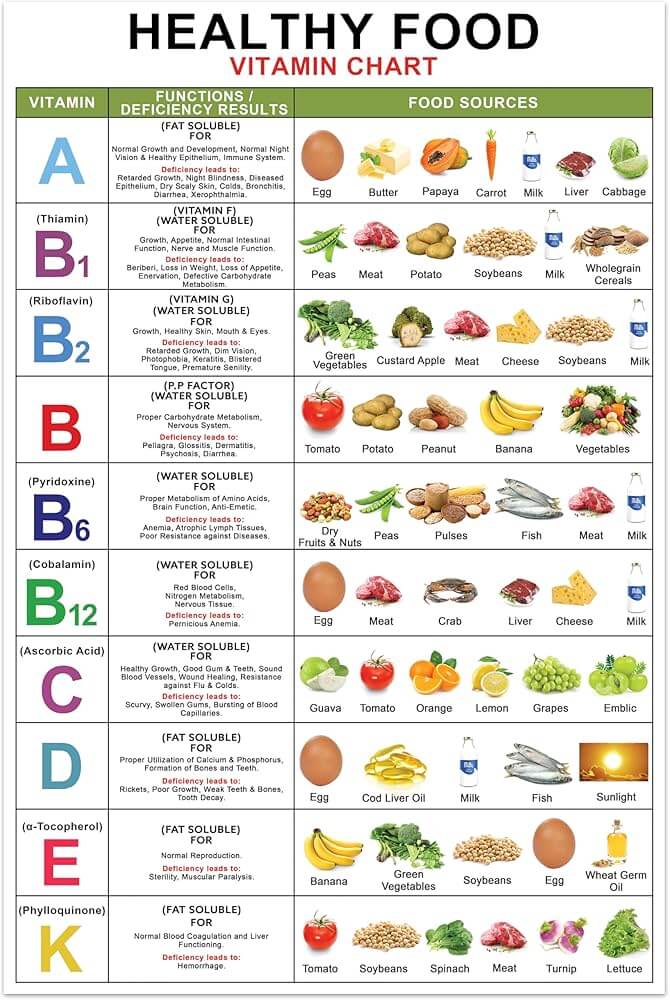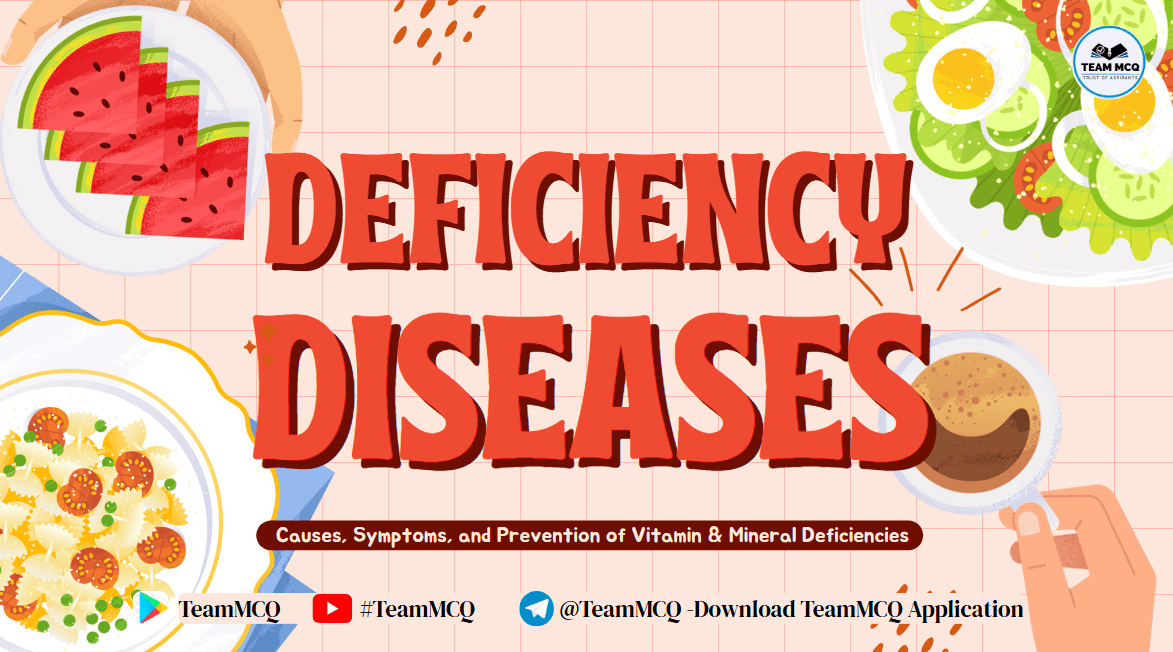Deficiency diseases caused by vitamin and mineral deficiencies. Learn about their causes, symptoms, and effective prevention strategies to maintain optimal health and well-being.
Introduction
Deficiency diseases are health conditions that arise when the body lacks essential nutrients, including vitamins and minerals, required for its optimal functioning. These diseases can occur when there is an insufficient intake of certain nutrients over time, leading to various physical complications. A balanced diet plays a critical role in preventing deficiency diseases, ensuring the body receives all the necessary elements for growth, immune function, and overall well-being. In this article, we will explore the causes, symptoms, and prevention of deficiency diseases, highlighting their impact on health and how they can be avoided through proper nutrition.
Understanding Deficiency and Deficiency Diseases
What Are Deficiency Diseases?
A balanced diet is fundamental to maintaining optimal health and physiological function. When an individual’s diet lacks specific essential nutrients—whether vitamins, minerals, or other micronutrients—it can lead to various deficiency diseases. These conditions emerge due to the body’s inability to perform critical functions in the absence of adequate nutritional support.
Deficiency diseases are broadly categorized based on the type of nutrient that is insufficient in the body. Such diseases are preventable and often reversible with timely intervention and nutritional correction. Understanding the causes, symptoms, and prevention methods is key to improving public health, especially in developing regions where malnutrition is prevalent.
List of Deficiency Diseases
Deficiency diseases arise when there is an insufficient intake of essential vitamins and minerals. Below is a list of common deficiency diseases caused by the lack of these nutrients:
Vitamins:
| Vitamin | Deficiency Disease | Symptoms and Effects |
|---|---|---|
| Vitamin A (Retinol) | Night Blindness | Difficulty seeing in low light, dry eyes, and increased risk of infections. |
| Vitamin B1 (Thiamine) | Beri-Beri | Weak muscles, fatigue, swelling, mental confusion, and potential heart failure. |
| Vitamin B2 (Riboflavin) | Retarded Growth, Bad Skin | Cracked lips (cheilosis), sore throat, swollen tongue, poor growth, and skin issues. |
| Vitamin B12 (Cyanocobalamin) | Anaemia | Extreme fatigue, nerve damage, dizziness, pale skin, and shortness of breath. |
| Vitamin C (Ascorbic Acid) | Scurvy | Bleeding gums, skin spots, swollen joints, and general weakness. |
| Vitamin D (Calciferol) | Rickets | Weak bones, bowed legs in children, dental problems, and bone pain. |
| Vitamin K (Phylloquinone) | Excessive Bleeding | Easy bruising, excessive bleeding during injury or surgery, difficulty clotting. |
Minerals:
| Mineral | Deficiency Disease | Symptoms and Effects |
|---|---|---|
| Calcium | Brittle Bones, Excessive Bleeding | Bone fractures, weak bones, and problems with blood clotting. |
| Phosphorus | Bad Teeth and Bones | Fragile teeth, bone pain, joint issues, and muscle weakness. |
| Iron | Anaemia | Fatigue, dizziness, weakness, shortness of breath, and pale skin. |
| Iodine | Goitre | Enlarged thyroid gland (goitre), neck swelling, weight gain, and difficulty regulating body temperature. |
| Copper | Low Appetite, Retarded Growth | Poor growth in children, low appetite, weakened immune system, and fatigue. |
Other Important Deficiency Diseases
Magnesium Deficiency:
- Disease: Muscle cramps, weakness, and fatigue.
- Symptoms: Irritability, confusion, abnormal heart rhythms, and muscle spasms.
Zinc Deficiency:
- Disease: Growth retardation, hair loss, and skin lesions.
- Symptoms: Impaired immune function, delayed wound healing, and loss of appetite.
Vitamin Deficiency Diseases
Vitamin deficiency diseases occur when the body lacks essential vitamins required for normal functioning. Each vitamin plays a specific role in maintaining health, and without an adequate supply, various health issues arise. Let’s explore some of the most common vitamin deficiency diseases and the vital nutrients they require:
Vitamin A Deficiency Disease: Night Blindness
Vitamin A is crucial for maintaining healthy vision, immune function, and skin integrity. When the body lacks vitamin A, it can lead to night blindness, a condition where individuals struggle to see in low-light conditions. This is especially common in children and can lead to complete blindness if left untreated.
Other Symptoms:
- Dry, rough skin
- Increased vulnerability to infections
- Damage to the cornea and eyes
Prevention: Consuming foods rich in vitamin A, such as carrots, spinach, and liver, can help prevent night blindness and other health issues associated with its deficiency.
Vitamin B1 Deficiency Disease: Beri-Beri
Vitamin B1 (Thiamine) is important for energy production and nervous system function. A deficiency of thiamine can result in beri-beri, a disease characterized by weakness, fatigue, and damage to the heart and nervous system.
Other Symptoms:
- Swelling in the legs
- Mental confusion
- Weak muscles and loss of coordination
Prevention: Vitamin B1 can be found in whole grains, legumes, pork, and nuts. Adequate intake of these foods helps prevent beri-beri and supports overall health.
Vitamin B2 Deficiency Disease: Retarded Growth and Bad Skin
Vitamin B2 (Riboflavin) is essential for the metabolism of fats, proteins, and carbohydrates. Its deficiency can cause a range of symptoms, including poor skin health and stunted growth, particularly in children. Retarded growth and bad skin are two common signs of vitamin B2 deficiency.
Other Symptoms:
- Cracks or sores on the lips (cheilosis)
- Red, swollen tongue
- Sore throat and eye irritation
Prevention: Vitamin B2 is abundant in dairy products, eggs, green leafy vegetables, and fortified cereals. Ensuring a balanced intake can help avoid these health problems.
Vitamin B12 Deficiency Disease: Anaemia
Vitamin B12 (Cyanocobalamin) plays a crucial role in red blood cell production and nerve function. A lack of vitamin B12 can lead to pernicious anaemia, a condition where the body cannot produce enough red blood cells, resulting in fatigue and weakness.
Other Symptoms:
- Pale skin
- Shortness of breath
- Muscle weakness
- Nerve damage, including numbness and tingling in hands and feet
Prevention: Vitamin B12 is mainly found in animal products such as meat, fish, poultry, and dairy. For those on plant-based diets, fortified foods or supplements may be necessary.
Vitamin C Deficiency Disease: Scurvy
Vitamin C (Ascorbic Acid) is vital for collagen synthesis, immune health, and wound healing. A deficiency of vitamin C can cause scurvy, which is characterized by swollen, bleeding gums, fatigue, and skin spots.
Other Symptoms:
- Easy bruising
- Joint pain and swelling
- Slow wound healing
Prevention: Citrus fruits, strawberries, bell peppers, and leafy greens are excellent sources of vitamin C. Regular consumption of these foods ensures the body gets the vitamin needed to prevent scurvy.
Vitamin D Deficiency Disease: Rickets
Vitamin D is critical for calcium absorption and bone health. A lack of vitamin D can lead to rickets, a disease that causes weakened bones and deformities, particularly in children.
Other Symptoms:
- Bowed legs and skeletal deformities
- Bone pain and weakness
- Delayed growth in children
Prevention: Sunlight exposure is the best source of vitamin D, as the skin produces it naturally when exposed to UV rays. Foods like fortified milk, fatty fish, and eggs also help maintain healthy vitamin D levels.
Vitamin K Deficiency Disease: Excessive Bleeding
Vitamin K plays a crucial role in blood clotting. A deficiency in vitamin K can lead to excessive bleeding and easy bruising. Excessive bleeding is particularly dangerous in infants, as they are at risk for bleeding in the brain, which can lead to serious complications.
Other Symptoms:
- Easy bruising
- Prolonged bleeding from cuts or injuries
- Heavy menstrual periods in women
Prevention: Vitamin K is found in green leafy vegetables, such as spinach and kale, as well as in some vegetable oils. Ensuring an adequate intake helps prevent excessive bleeding.
Here’s a small table summarizing the vitamin deficiency diseases:
| Vitamin | Deficiency Disease |
|---|---|
| Vitamin A (Retinol) | Night Blindness |
| Vitamin B1 (Thiamine) | Beriberi |
| Vitamin B2 (Riboflavin) | Retarded Growth, Bad Skin |
| Vitamin B12 (Cyanocobalamin) | Anaemia |
| Vitamin C (Ascorbic Acid) | Scurvy |
| Vitamin D (Calciferol) | Rickets |
| Vitamin K (Phylloquinone) | Excessive Bleeding due to Injury |

Conclusion on Vitamin Deficiency Diseases
Vitamin deficiency diseases are a significant concern for overall health. A well-balanced diet rich in essential vitamins is critical for preventing these conditions. By understanding the role of each vitamin and incorporating food sources that provide these nutrients, individuals can avoid deficiency diseases and maintain optimal health.
In the following sections, we will explore the different types of mineral deficiency diseases and their prevention strategies.
Mineral Deficiency Diseases
Minerals are essential inorganic nutrients that support a wide range of physiological functions, including bone health, nerve function, and fluid balance. When the body lacks vital minerals, it can result in several mineral deficiency diseases, each with distinct symptoms and health impacts. Below are some of the key minerals and the diseases associated with their deficiency:
Iodine Deficiency Disease: Goitre
Iodine is crucial for the production of thyroid hormones, which regulate metabolism and support healthy growth and development. A deficiency of iodine can lead to goitre, an enlargement of the thyroid gland that can result in difficulty swallowing and breathing.
Other Symptoms:
- Swelling in the neck
- Weight gain or difficulty losing weight
- Fatigue and weakness
Prevention: Iodine is commonly added to table salt, making it one of the best sources of iodine. Seafoods like fish and shellfish, as well as dairy products, also contain iodine, helping to prevent goitre.
Iron Deficiency Disease: Anaemia
Iron is a vital mineral needed for the production of hemoglobin, a protein in red blood cells responsible for transporting oxygen throughout the body. When there is an insufficient amount of iron, anaemia can develop, leading to symptoms like fatigue, weakness, and difficulty concentrating.
Other Symptoms:
- Pale or yellowish skin
- Shortness of breath
- Dizziness
- Cold hands and feet
Prevention: Iron-rich foods include red meat, poultry, fish, lentils, beans, and fortified cereals. Iron absorption can be enhanced by consuming vitamin C-rich foods, such as citrus fruits, alongside iron-containing foods.
Calcium Deficiency Disease: Osteoporosis and Brittle Bones
Calcium is the most abundant mineral in the human body and is crucial for maintaining strong bones and teeth. A deficiency in calcium can lead to osteoporosis, a condition where the bones become weak and fragile, making them more prone to fractures.
Other Symptoms:
- Muscle cramps and spasms
- Numbness or tingling in the fingers
- Weak or brittle nails
Prevention: Dairy products like milk, cheese, and yogurt are rich in calcium. Non-dairy sources include leafy greens, fortified plant-based milks, and almonds. Ensuring adequate calcium intake is essential for bone health, particularly in growing children and older adults.
Phosphorus Deficiency Disease: Weak Bones and Teeth
Phosphorus works closely with calcium to build and maintain healthy bones and teeth. A deficiency in phosphorus can cause weakened bones and teeth, leading to increased risk of fractures and dental issues.
Other Symptoms:
- Bone pain and joint discomfort
- Weak muscles
- Irritability and fatigue
Prevention: Phosphorus is found in protein-rich foods like meat, poultry, fish, nuts, seeds, and legumes. Dairy products also provide good amounts of phosphorus.
Magnesium Deficiency Disease: Muscle Cramps and Fatigue
Magnesium is involved in over 300 biochemical reactions in the body, including muscle and nerve function, and bone health. A deficiency in magnesium can lead to muscle cramps, fatigue, and irregular heartbeats.
Other Symptoms:
- Nausea and vomiting
- Loss of appetite
- Weakness and fatigue
- Tingling or numbness in the body

Prevention: Magnesium can be obtained from green leafy vegetables, nuts, seeds, whole grains, and legumes. Ensuring a balanced diet with magnesium-rich foods can help prevent deficiency.
Zinc Deficiency Disease: Impaired Immune Function
Zinc is essential for immune function, protein synthesis, wound healing, and DNA synthesis. A deficiency in zinc can result in weakened immune response, slow wound healing, and impaired growth in children. It can also lead to alopecia (hair loss) and other skin issues.
Other Symptoms:
- Delayed wound healing
- Reduced sense of taste or smell
- Hair loss
- Stunted growth in children
Prevention: Zinc-rich foods include meat, shellfish, legumes, seeds, nuts, and dairy products. Zinc supplements may also be considered for those who are at risk of deficiency.
Here’s a small table summarizing the mineral deficiency diseases:
| Mineral | Deficiency Disease |
|---|---|
| Iodine | Goitre |
| Iron | Anaemia |
| Calcium | Osteoporosis, Brittle Bones |
| Phosphorus | Weak Bones and Teeth |
| Magnesium | Muscle Cramps, Fatigue |
| Zinc | Impaired Immune Function, Alopecia |
Conclusion on Mineral Deficiency Diseases
Minerals are indispensable for a variety of bodily functions, from bone health to immune system performance. A deficiency in essential minerals can lead to numerous health complications. By ensuring a balanced diet rich in these critical nutrients, individuals can prevent mineral deficiency diseases and maintain their overall health and well-being.
In the next section, we’ll discuss the preventive measures for mineral deficiency diseases and tips for achieving a well-rounded nutrient intake.
Prevention of Deficiency Diseases
Deficiency diseases can be effectively prevented by adopting a holistic approach that focuses on maintaining a well-balanced diet and making mindful food preparation choices. Here are some essential practices to help prevent the onset of deficiency diseases caused by both vitamin and mineral deficiencies:
- Consume Simple, Whole Foods:
- Include nutrient-dense foods in your daily diet, such as groundnuts, soybeans, pulses, and whole grains. These foods are rich in essential vitamins, minerals, proteins, and fiber that support overall health and prevent deficiencies.
- Avoid Nutrient Loss During Cooking:
- Prolonged cooking, especially at high temperatures, can cause significant loss of vitamins and minerals in food. Likewise, undercooking can reduce the bioavailability of nutrients. Be mindful of cooking times and methods (e.g., steaming or grilling) to preserve the nutritional value of your food.
- Tip: Avoid overcooking vegetables and fruits. Raw or lightly cooked vegetables like salads retain their full nutrient profile.
- Proper Storage of Fruits and Vegetables:
- Cutting and storing vegetables and fruits for an extended period can degrade their nutritional value, leading to a loss of vitamins and minerals. Store fresh produce in cool, dry places, and consume them as soon as possible to maximize their health benefits.
- Fermentation and Sprouting:
- Fermenting and sprouting foods not only enhance their nutritional value but also make nutrients more bioavailable to the body. For example, sprouted grains and legumes have increased levels of essential amino acids and vitamins like B vitamins.
- Tip: Fermented foods such as yogurt, kimchi, and sauerkraut are excellent sources of probiotics that support digestion and nutrient absorption, while sprouted pulses provide higher levels of minerals like iron and zinc.
- Diverse, Balanced Diet:
- Ensure a wide variety of foods from different food groups to cover the spectrum of vitamins and minerals your body requires. A balanced diet containing fruits, vegetables, whole grains, lean proteins, and dairy will help prevent micronutrient deficiencies.
- Tip: Strive to include colorful fruits and vegetables, as they often contain a variety of vitamins and antioxidants that work synergistically to improve health and prevent deficiencies.
By integrating these practices into daily life, individuals can significantly reduce the risk of deficiency diseases and ensure their bodies are nourished with the nutrients they need for optimal function.
Frequently Asked Questions (FAQs) on Deficiency Diseases
Q1: What are the long-term effects of vitamin D deficiency in adults?
A1: Vitamin D deficiency in adults can lead to severe bone health issues such as osteoporosis, where bones become weak and brittle. It also increases the risk of rickets in children and can cause muscle weakness, leading to frequent falls and fractures. Chronic deficiency may also contribute to cardiovascular diseases, diabetes, and an impaired immune system, heightening susceptibility to infections and autoimmune disorders.
Q2: How can iron deficiency anemia be diagnosed and treated?
A2: Iron deficiency anemia is diagnosed through a blood test that measures levels of hemoglobin, ferritin (iron stores), and transferrin (iron transport protein). Treatment involves iron supplementation, either orally or intravenously, depending on the severity. A diet rich in iron-rich foods like red meat, spinach, and legumes, combined with vitamin C, can enhance iron absorption. In some cases, treatment may also involve addressing the underlying cause of the deficiency, such as intestinal bleeding or malabsorption issues.
Q3: What are the potential neurological consequences of vitamin B12 deficiency?
A3: Vitamin B12 deficiency can result in severe neurological complications. These include nerve damage, tingling and numbness in hands and feet (peripheral neuropathy), muscle weakness, and difficulty walking. Over time, a prolonged deficiency can cause cognitive decline, memory loss, dementia, and mood disorders like depression. In extreme cases, paralysis and irreversible nerve damage may occur if not treated promptly.
Q4: Can a person with a normal diet still suffer from a vitamin deficiency?
A4: Yes, it’s possible for individuals with what appears to be a normal diet to suffer from vitamin deficiencies. Conditions such as malabsorption (due to celiac disease, Crohn’s disease, or gastric surgery), poor gut health, or certain medications (such as proton pump inhibitors for acid reflux) can inhibit the body’s ability to absorb essential nutrients, even when they are present in the diet. Additionally, poor food choices and unbalanced meals can lead to nutrient imbalances, even if the overall calorie intake seems adequate.
Q5: How does vitamin A deficiency contribute to immune system dysfunction?
A5: Vitamin A is crucial for the maintenance of healthy skin, the mucous membranes in the eyes, lungs, and digestive system, all of which are key components of the body’s first line of defense against infections. A deficiency impairs the immune response, making the body more susceptible to infections, particularly in children. Additionally, it can lead to dry eyes, and night blindness, and increase the risk of respiratory infections and diarrheal diseases.
Q6: What is the connection between calcium deficiency and osteoporosis?
A6: Calcium is an essential mineral for bone health as it is a major component of the bone matrix. Chronic calcium deficiency leads to low bone density, making bones more fragile and prone to fractures. Over time, this can develop into osteoporosis, a condition where bones become porous and brittle, significantly increasing the risk of fractures, especially in older adults. Calcium deficiency also interferes with proper muscle function and nerve transmission, leading to muscle cramps and spasms.
Q7: How does the deficiency of iodine affect pregnancy and fetal development?
A7: Iodine deficiency during pregnancy is one of the leading causes of preventable mental retardation in children. It can lead to cretinism, stunted growth, and severe cognitive impairments in the infant. Additionally, iodine deficiency can cause miscarriage, stillbirth, and complications during childbirth. It impairs thyroid function, leading to an increase in maternal hypothyroidism, which disrupts metabolic processes and can result in developmental delays in the baby.
Q8: Why is vitamin K critical for newborns, and how does its deficiency affect them?
A8: Vitamin K is essential for blood clotting as it is involved in the synthesis of clotting factors. Newborns are particularly vulnerable to vitamin K deficiency because they have low levels of vitamin K at birth and limited ability to produce it due to immature gut flora. Without sufficient vitamin K, newborns are at risk for hemorrhagic disease of the newborn, a condition that causes severe bleeding, especially in the brain and intestines, potentially leading to long-term neurological damage or death.
Q9: Can deficiency diseases occur due to overconsumption of certain foods or vitamins?
A9: Yes, overconsumption of certain vitamins or minerals can lead to toxicity, which may exhibit symptoms similar to deficiency diseases. For instance, excessive intake of vitamin A (from supplements) can lead to hypervitaminosis A, causing nausea, headaches, and liver damage. Similarly, too much iron can cause iron overload, damaging organs like the liver and heart. Balancing intake through whole foods and avoiding overreliance on supplements is key to preventing both deficiency and toxicity.
Q10: How can the prevalence of vitamin and mineral deficiency diseases be reduced in developing countries?
A10: In developing countries, public health initiatives are crucial to combating vitamin and mineral deficiencies. Strategies include food fortification (such as adding iodine to salt and vitamin A to oils), promotion of diverse diets that include local nutrient-rich foods, and supplementation programs (especially for vulnerable populations like children and pregnant women). Additionally, educating communities about the importance of nutrition and healthy eating habits, alongside improving healthcare infrastructure and access to clean water, can significantly reduce the prevalence of deficiency diseases.



